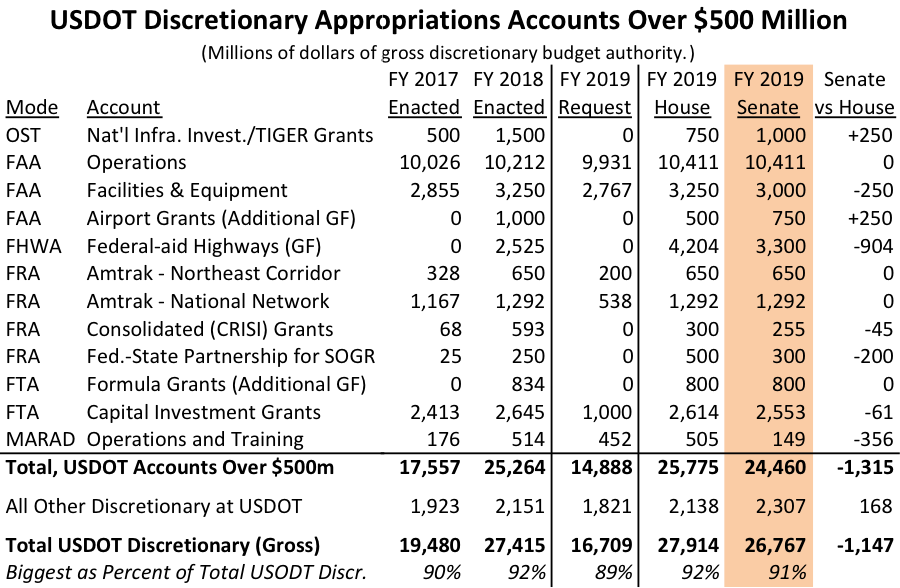July 20, 2018
On Monday evening, the U.S. Senate will begin consideration of a four-bill “minibus” package of appropriations bills for fiscal year 2019, including the Transportation-HUD funding bill.
Yesterday, the House of Representatives passed H.R. 6147, a minibus package containing two bills (the Interior and Environment bill and the Financial Services and General Government bill). After the official paperwork on that legislation was messengered over to the Senate yesterday afternoon, Majority Leader Mitch McConnell (R-KY) asked and received unanimous consent to bring up the appropriations bill on the Senate floor on Monday evening following the first and only roll call vote of the day (a 5:30 p.m. “bed check” vote on confirming the new Secretary of Veterans Affairs.
When the Senate takes up H.R. 6147, Appropriations chairman Richard Shelby (R-AL) or a designee will offer an amendment in the nature of a substitute consisting of the text of not just the corresponding Senate versions of the Interior/Environment and Financial Services bills, but also the Transportation-HUD bill and the Agriculture bill. (The text of the Senate THUD bill is here and the explanatory committee report is here.)
The four-bill package will then be open for amendment under the usual Senate rules (which are tricky – it’s first come, first served on offering amendments, but actually getting a vote on an amendment if the chairman doesn’t like it can be difficult).
The Senate THUD bill provides $26.8 billion in appropriations for the Department of Transportation, which is $1.1 billion less than the House bill and $648 million less than the 2018 level but is still an astounding $7.3 billion more than was appropriated in 2017. (The historically high 2018 and 2019 levels are a result of the two-year bipartisan budget deal enacted in February 2018. The absence of any such deal for 2020 means that next year will be even more difficult, so enjoy the giant piles of money while they last.)
In terms of funding, the major House-Senate difference is a $904 million discrepancy on how much money from the general fund to give to the federal-aid highways account (in addition to the obligation limitation on $45.3 billion in Highway Trust Fund contract authority that will go to the program under both the House and Senate bills). There are smaller House-Senate differences on relative priorities within the two aviation capital accounts and on the relative priority of TIGER grants versus railroad grants. And what appears to be a large difference over Maritime Administration operations is really more of a presentation difference – the Senate bill breaks up that account in two while the House bill does not.

Senate leaders hope to pass this second minibus package by the end of next week (fingers crossed). If they are able to do so, this opens up an option for the House to proceed directly to a House-Senate conference committee without having to bring its own Transportation-HUD and Agriculture bills to the floor separately. (It is not yet clear whether or not House leaders would take that option.) This also means that the DOT budget might be able to avoid the end-of-the-year lame-duck legislative logjam that could be even less productive than usual if control of one or both chambers changes hands in the November elections.
However, one big discrepancy remains to be settled before any appropriations bills take the final step towards enactment. Negotiations on the first minibus package (three bills – Energy and Water, Legislative Branch, and Military Construction/Veterans) have stalled for the last week even though the Senate passed its own version of the package last month. The issue is whether or not the Appropriations Committees will have to pay for the cost of a new veterans health benefit law, the VA MISSION Act. The popular legislation, which passed Congress overwhelmingly, was unfunded. Shelby and his ranking minority member Pat Leahy (D-VT) are presenting a united front on the issue, insisting that the cost of the program not come out of the annual Appropriations non-defense funding total allocated to them under the Budget Control Act spending caps. But House leaders are insisting on keeping the program’s funding classified as discretionary and subject to the spending cap.
The funding required for the program isn’t that much in 2019 ($1.1 billion) – Shelby and Leahy could easily find room under the committee’s $597 billion non-defense allocation if they wanted to. But this argument is more about the precedent being established – the Congressional Budget Office estimates that the cost of the program will rise to $9.9 billion next year and will hit $14 billion per year by 2023.




